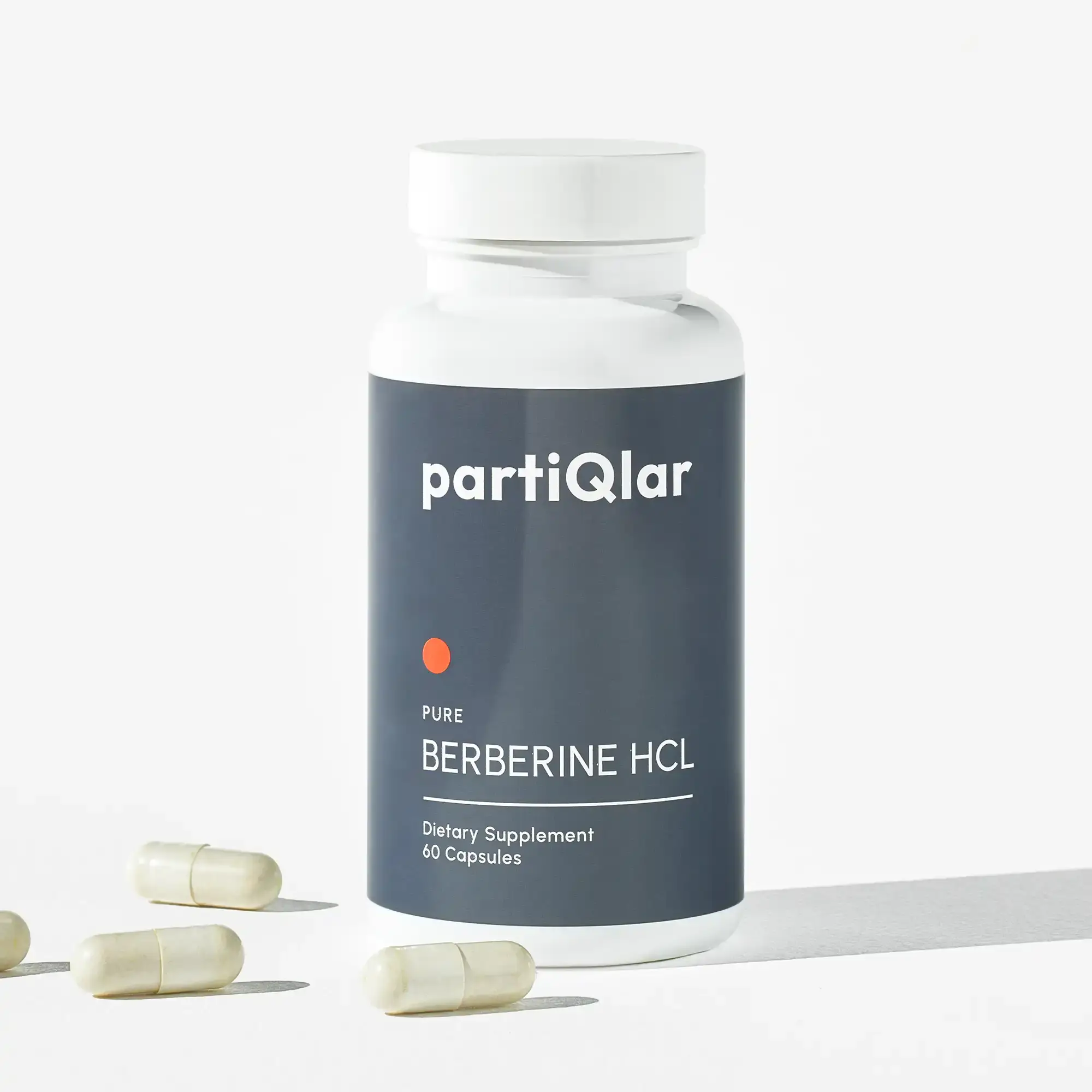Discover the essential supplements recommended by David Sinclair for enhancing health and longevity. Optimize your wellness journey.
Berberine and Weight Loss: Natural Strategies for Effective Blood Sugar Management
- Nutrition
- October 17, 2024
- Jan Vincent Beltran, PhD

Related Product
Highlights
- Berberine is a naturally occurring compound that has potential weight loss benefits.
- Research shows that berberine works by activating the metabolism-associated AMPK enzyme which promotes glucose uptake and inhibits insulin resistance.
- Berberine has several promising health benefits, but it is more prominently known for its role in supporting weight loss, blood sugar control, and cardiovascular health.
- Taking 500mg two to three times a day for over 8 weeks may provide benefits in weight management¹, (but berberine supplementation can lead to stomach upset, so a daily dose in 500 to 900 mg range is suggested in clinical trials to ameliorate the side effects.

Introduction
Do you feel like it’s easier to gain an extra pound when you binge eat now compared to when you were younger? It’s not your imagination.
As we age, our metabolism slows down. Aside from slow metabolism, other health risk factors that can spiral into weight gain as we age include low physical activity, unhealthy diet, loss of muscle mass, and individual responses to specific foods.
Hence, a lot of people may experience losing weight to be challenging, especially when it comes to finding effective and sustainable methods. If you’ve tried countless diets and exercise routines, but are unable to maintain it long term, you might want to consider berberine supplementation. With its ability to activate a metabolic switch called “AMPK”, berberine has been gaining popularity in health circles for its benefits in weight management and blood sugar control.
Here, we’ll break down the science behind berberine, explore its benefits, and offer practical advice on incorporating it into your routine.. antioxidant and anti-inflammatory properties and is commonly used for its sleep-promoting effects.
Apigenin has garnered significant attention within the scientific community due to its diverse pharmacological effects and other potential therapeutic applications. It is commonly included in a healthy lifestyle through foods containing apigenin or nutraceutical supplements to support overall well-being.
What is Berberine?
Berberine is a naturally occurring, bioactive compound found in several plants, including barberry, goldenseal, and Oregon grape. It belongs to a class of compounds called alkaloids. Berberine-containing herbs have been used for thousands of years in traditional Chinese and Ayurvedic medicine. Historically, berberine has been used for treating a variety of ailments, ranging from digestive issues to infections, thanks to its significant antimicrobial and anti-inflammatory properties.
But beyond these traditional uses, recent findings uncover even more about berberine’s potential, including berberine’s positive effects on weight management and blood sugar regulation. With promising benefits and a long history of safe use, berberine is a compound worth exploring for those seeking natural ways to improve their health.
How does Berberine work?
So, how does berberine work in the body? The answer lies in its ability to activate an enzyme called AMP-activated protein kinase (AMPK)². Often referred to as the “metabolic master switch,” AMPK plays a crucial role in regulating energy balance in the body. When activated, it helps to improve insulin sensitivity, boost fat burning, and reduce fat storage—all of which are key factors in managing both blood sugar and body weight.
Berberine’s influence on blood glucose is particularly noteworthy. When you consume a carb-heavy meal, your blood sugar levels can spike, leading to a cascade of effects, including inflammation and potential weight gain. Berberine helps to modulate this response by improving the efficiency of insulin, the hormone responsible for controlling blood sugar levels. By keeping blood sugar levels stable, berberine reduces the risk of developing chronic conditions like obesity and type 2 diabetes.
Berberine vs Metformin
Due to similar effects, berberine is often compared with metformin, a common prescription drug for diabetes. Metformin works by improving insulin sensitivity and lowering blood sugar levels. Berberine offers comparably similar benefits³, but with the added bonus of being a natural compound, which may appeal to those looking for more holistic approaches to health.
Berberine vs Ozempic
Berberine is also compared with Ozempic, an injection medication that is FDA-approved for the treatment of diabetes but gained magnified attention due to its benefits on weight management. While Ozempic works by mimicking a hormone that regulates appetite, berberine’s effects are broader, addressing multiple pathways involved in metabolism and other biological processes. Meanwhile, if you’re afraid of needles and injections, berberine oral capsules may be a preferable alternative. Besides, berberine is much cheaper — ozempic costs about $935 without insurance for a month’s supply, while berberine only costs $93.5 for a 2-month supply bottle..

Benefits of Berberine
If you’re looking for a supplement with multiple health benefits for overall health, you’re in the right place. The benefits of berberine extend beyond just blood sugar control and weight management.
Helps in weight loss
A natural aid for weight loss, berberine helps boost metabolism by activating the AMPK enzyme, encouraging the body to break down fat and use it as energy. At the molecular level, berberine was also found to suppress the growth of fat cells⁴, which may make it harder for the body to gain weight. Overall, berberine reduces fat production and body fat ratio.
However, is berberine really effective? Here’s a berberine weight loss review: a 2020 systematic review and meta-analysis of 12 human clinical trials published in Clinical Nutrition ESPEN⁵, showed that berberine supplementation led to moderate but significant reductions in body weight, body mass index (BMI), and waist circumference. You may need a daily intake of up to 1.5 gram of berberine for more than 8 weeks to observe significant benefits in weight management⁶.
Aids in blood sugar control
Another well-known benefit of berberine is its ability to regulate blood sugar levels. Maintaining stable blood sugar is crucial for overall health and well-being. Adding berberine to your daily health regimen can safeguard your blood sugar levels, thereby preventing the development of metabolic diseases like diabetes.
For individuals with type 2 diabetes or insulin resistance, berberine helps by increasing insulin sensitivity⁷, making the body more efficient at using insulin to lower your blood glucose levels. This means that fewer calories are stored as fat, particularly in areas prone to stubborn fat accumulation, such as the abdomen.
It also inhibits both alpha-amylase and alpha-glucosidase⁸ enzymes responsible for breaking down carbohydrates into simple sugars, leading to a slower release of glucose into the bloodstream. This can prevent the spikes and crashes in blood sugar that many people experience after consuming a carb-heavy meal, contributing to better energy levels and reducing the risk of developing further metabolic issues.
Interestingly, recent animal studies⁹ suggest that berberine is superior to metformin in ameliorating hyperlipidemia and obesity.
Supports cardiovascular health
Beyond weight loss and blood sugar control, a bulk of scientific evidence also points out berberine’s benefits in cardiovascular health. Berberine has been shown to lower LDL (the “bad”) cholesterol levels, which are key risk factors for heart disease.
By improving lipid profiles, berberine helps reduce the risk of developing cardiovascular issues such as heart attacks and strokes. Indeed, in a 2023 systematic review and meta-analysis ¹⁰ of 44 human clinical trials supports the potential of berberine against cardiovascular diseases.
Promotes overall health
Berberine is another versatile compound with documented several health benefits supporting overall health. It possesses various properties, such as anti-inflammatory¹¹, anti-oxidant¹² , anti-diarrhea¹³ , anti-microbial¹⁴, neuroprotection¹⁵,, anti-arthritis¹⁶, anti-eczema ¹⁷, anti-blood clots ¹⁸, and anti-PCOS ¹⁹.
Another preliminary, but interesting application of berberine is its potential anti-insomnia effect²⁰. The animal study revealed that berberine was as effective as the drug diazepam (Valium) in easing insomnia symptoms. Interestingly, the researchers found that berberine acted more quickly than Valium and also helped the sleep-deprived rats recover their memory faster.
With this many health benefits, it’s no wonder that berberine has also been investigated by scientists in the anti-aging and longevity field. One interesting finding in animal studies demonstrat²¹ that berberine inhibits senescent cells and can extend the lifespan of chemotherapy-treated and naturally-aged mice by ~52% and ~16%, respectively. Dubbed “zombie cells”, senescent cells are damaged, undying cells that can negatively impact the normal functions of the body and promote aging and chronic diseases long term. With berberine, cells can be protected from senescence, which may exert an anti-aging effect.
Dosage and Administration
If you’re considering adding berberine to your routine, it’s important to know how to use it effectively.
Studies have used a daily dose of around 600 to 2,700 mg of berberine in lowering fasting and long-term blood glucose levels of people with type 2 diabetes by about 20% ²² and 12%²³, respectively. Berberine clinical trials are consistent in showing significant decrease in blood glucose, total cholesterols, and LDL “bad” cholesterol levels of participants. NIH also summarized that berberine may take over 8 weeks to work for weight loss in people taking more than 1 gram dose daily²⁴.
However, berberine was found to cause stomach problems at higher doses, including constipation, diarrhea, or flatulence which may last for 2-4 weeks weeks. To ameliorate the gastrointestinal side effects, the dosage recommendations were lowered in clinical trials to 500-900 mg per day as the best solution.
Berberine is available in several forms, including capsules, powders, and liquid extracts. Capsules are the most convenient option, especially because of berberine’s bitterness. A commonly available form of berberine in the market is berberine hydrochloride, but it has lower solubility, which means that it has lower intestinal absorption. If you’re seeking enhanced absorption, berberine phytosome is an option. This form combines berberine with phospholipids, which can improve its bioavailability, meaning more of the active ingredient is absorbed by the body.
When it comes to timing, berberine is best taken with meals to help manage blood sugar levels effectively. For those looking to support weight loss, it’s particularly beneficial to take berberine before or during mealtime, as this is when blood sugar levels are most likely to spike. You can also take berberine before bed as it has potential sleep aid properties, but it can also help regulate your fasting blood sugar level especially when your dinner is carb-heavy.
Best Berberine Supplements
With so many berberine supplements on the market, how do you choose the best brand of berberine?
Here are a few tips to help you make an informed decision:
- Dosage: Ensure the supplement provides an effective dose of berberine—Around 500 to 1,500 mg per day is typically recommended in the market, but 500-900 mg per day is suggested in clinical trials to ameliorate severe stomach side effects.
- Quality: Look for supplements from reputable brands that are cGMP-compliant and underwent third-party testing to ensure high-quality manufacturing standards and up-to-par purity and potency of products.
- Form: Berberine is available in capsule, powder, or liquid forms. However, while powders and liquids can be easier to adjust in terms of dosage, note that it is distinctly bitter-tasting, hence, capsules are generally the most convenient.
- Cost: Compare the pricing of supplement brands per serving to get the best deal. Some berberine supplements are more expensive and choosing the one within your budget is easier on the pocket long term.
- Reviews: Customer ratings and reviews are direct hints on the product’s quality based on actual user experience. Go to the company website or selling platforms to see what berberine reviews people share.

Alternatives to Berberine
While berberine is a very promising supplement backed by various studies and clinical trials, there are other options available for those looking to manage blood sugar and support weight loss. However, berberine is not found in common food sources.
Here are berberine alternatives that offer similar weight loss benefits include:
- Cinnamon. Known for its ability to lower blood sugar levels, cinnamon is an alternative choice for those looking to manage their glucose levels naturally. A review of 12 human trials²⁵ suggests that cinnamon dosages of ≥2 grams per day taken over 12 weeks may reduce body weight, BMI, fat mass, and waist circumference.
- Alpha-Lipoic Acid (ALA). ALA is an antioxidant that helps improve insulin sensitivity and reduce inflammation, both of which are important for healthy blood sugar levels. For weight management, research²⁶ shows that a daily 1800 mg dose provides a modest weight loss in obese subjects.
Fenugreek. Often used in traditional medicine at 5-10 grams daily, fenugreek seed powder has been shown to help lower blood sugar levels and improve insulin function ²⁷.
Side Effects and Safety
Berberine is generally considered safe. However, some people may experience potential adverse reactions. The most common side effects include gastrointestinal issues like stomach cramps, diarrhea, or constipation particularly when first starting the supplement. These side effects are usually mild and tend to subside as your body adjusts to the supplement, but lowering the dose may help with stomach upset.
However, some individuals should avoid berberine. For example, if you have low blood pressure or are already taking medications for diabetes, consult your healthcare provider first before starting berberine, as it may enhance the effects of these medications. Berberine by itself can already lower blood glucose levels so if you are already on diabetes medication, the combination can push your blood glucose levels to very low levels. Additionally, berberine also has a blood pressure-lowering effect, so similarly, if you already have low blood pressure, it may cause your blood pressure to drop to dangerously low levels.

Conclusion
If you have already tried a lot of weight management techniques without seeing lasting results, give berberine a try. As more people turn to natural solutions for their health, berberine stands out as a promising option.
Offering a range of health benefits, particularly in the areas of blood sugar management and weight loss, berberine may help you shed a few pounds, stabilize your blood sugar levels, or simply enhance your overall health if you add it to your wellness routine.
While berberine’s wonder in weight management is evident across clinical trials, it’s best if you combine it with a healthy diet, regular exercise, and good sleep for maximum health benefits.
Explore Products
Related Articles
This blog explores the link between genetics and lifespan, highlighting how certain genes impact longevity and discussing lifestyle choices that can enhance health.
Discover whether fasting truly delivers on its promises of longevity and rejuvenation, backed by scientific insights. Uncover the potential benefits and the reality behind the hype!



